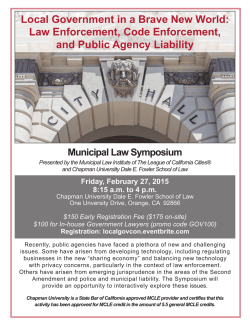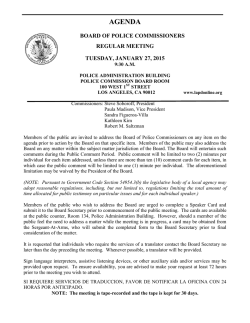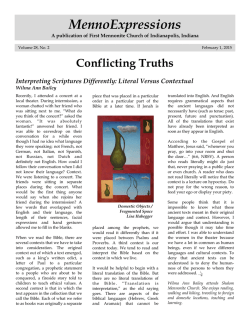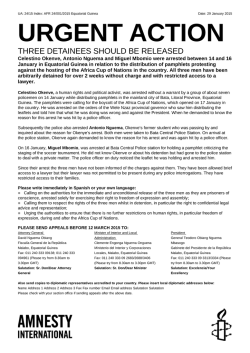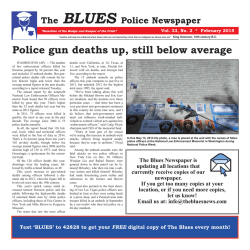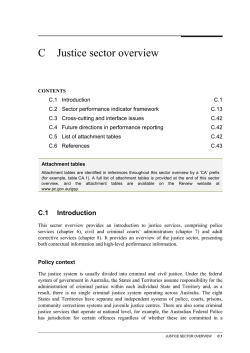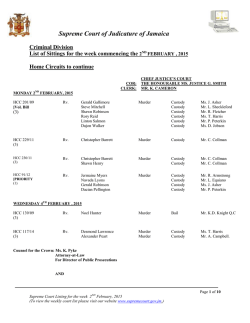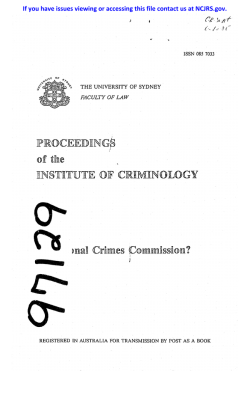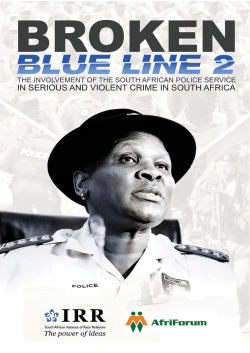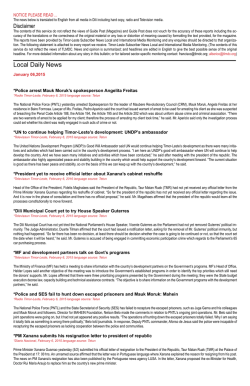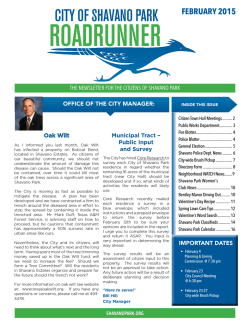
Police Technology - Informa Australia
PRESENTING THE 3rd ANNUAL Police Technology Forum Supporting law enforcement through strategic innovation, planning and design 17th - 18th March 2015 | Hotel Realm, Canberra PRESENTATIONS FROM: Superintendent Yuli Cahyanti, Director for Plans and Programs, ASEANAPOL, Peacekeeping Monitor and Evaluation, Indonesian Police Deputy Commissioner Ross Barnett APM, Specialist Operations, Queensland Police Service Assistant Commissioner Paul Dickson, Crime Service, South Australia Police Joann Corcoran, Chief Information Officer, Attorney-General’s Department Lee Walton, Chief Information Officer, CrimTrac Chris Robson, Chief Information Officer, New South Wales Police Dr Maria Milosavlejevic, Chief Information Officer, Australian Crime Commission Mark Burgess, Chief Executive Officer, Police Federation of Australia Paul Cross, Assistant Secretary, Identity Branch, Risk Fraud and Integrity Division, Department of Immigration & Border Protection Commander Alf Fordham, Traffic and Emergency Response, Western Australia Police Mark Skidmore, Director Aviation Safety, Civil Aviation Safety Authority Dr Rick Brown, Deputy Director - Research, Australian Institute of Criminology Dr Rebecca Heyer, Senior Human Scientist (Biometrics), Defence Science and Technology Organisation Topics include: – Crime prevention and design – Biometrics and Identity Security – Privacy and Surveillance – Counter Terrorism Sponsored by: – Police Militarization – Forensics www.informa.com.au/policetech2015 DAY 1 Police Technology Forum Tuesday 17th March 2015 8:50 Opening remarks from the Chair 15:40 From confusion to Fusion: the ACC’s journey towards proactive discovery 9:00 International Keynote 10:20 Strategy, Policy & Innovation - applications of identity resolution services to law enforcement Crime has no physical boundaries, placing more importance on national and international information sharing, coordination and collaboration to identify and address the highest threats. This new information environment requires multi-disciplinary teams including subject matter experts, investigators, analysts, technologists and advanced analytics specialists to achieve more efficient and effective law enforcement outcomes. The Australian Crime Commission’s big data journey began in 2010 with the creation of the National Criminal Intelligence Fusion Capability (‘Fusion’). Fusion brought organisational agility to respond to an increasingly dynamic and complex law enforcement environment. Fusion was designed to harness the variety of information received through increased information sharing and collection, and to support more efficient and effective decisionmaking. Paul Cross, Assistant Secretary, Identity Branch, Risk Fraud and Integrity Division, Department of Immigration & Border Protection Dr Maria Milosavlejevic, Chief Information Officer, Australian Crime Commission 11:00 Networking and refreshment break Dr John Moss, National Manager – Intelligence, Australian Crime Commission 11:30Face Recognition Technology in the Policing Environment: The Human Element 16:20 CIO Panel Superintendent Yuli Cahyanti, Director for Plans and Programs, ASEANAPOL, Peacekeeping Monitor and Evaluation, Indonesian Police 9:40 Keynote Address Joann Corcoran, Chief Information Officer, Attorney General’s Department Biometrics and Identity Security —— Creating a climate for technology innovation —— Applications to law enforcement —— Mitigating the cyber threat and emerging challenges —— Challenges and practical limitations —— Fostering best practices in interagency communication and collaboration —— Improving design and operational effectiveness Dr Rebecca Heyer, Senior Human Scientist (Biometrics), Defence Science and Technology Organisation Crime prevention and design 12:10 Utilisation of technology in the management of serious crimes Assistant Commissioner Paul Dickson, Crime Service, South Australia Police 12:50 Lunch and networking break 13:50 Afternoon Keynote —— Q&A Dr Maria Milosavlejevic, Chief Information Officer, Australian Crime Commission Chris Robson, Chief Information Officer, New South Wales Police Lee Walton, Chief Information Officer, CrimTrac Joann Corcoran, Chief Information Officer, Attorney General’s Department 17:20 Closing remarks from the Chair 17:30 Networking drinks Mark Burgess, Chief Executive Officer, Police Federation of Australia 14:30 Designing out crime: The role of the police There is much that can be done to design products, services and systems in a way that will reduce the opportunities for crime. Using a range of case studies, this presentation will explore ways of designing out crime. Particular attention will be paid to exploring the various roles that can be played by the police in supporting, advocating, and lobbying for designing changes that prevent crime. This will draw on examples where police services have successfully worked directly with manufacturers and service providers to design out crime opportunities, both in Australia and internationally. Dr Rick Brown, Deputy Director – Research, Australian Institute of Criminology 15:10 Networking and refreshment break Venue Details Hotel Realm, Canberra 18 National Circuit, Canberra ACT 2600 Phone: (02) 6163 1800 www.hotelrealm.com.au www.informa.com.au/policetech2015 DAY 2 Police Technology Forum Wednesday 18th March 2015 9:00 Opening remarks from the Chair 15:30 Network and refreshment break 9:10 Keynote Address Police militariSation in Australia The ICT blueprint for national police information sharing Lee Walton, Chief Information Officer, CrimTrac 16:00Mitigating the shift from civilian peacekeeping to an armoured force —— The changing psychology between armed officers and the public 9:50 Case Study: Managing complex policing and security operations – key learnings from the G20 —— Governing the transition and allocation of capabilities biometrics police agencies Deputy Commissioner Ross Barnett APM, Specialist Operations, Queensland Police Service —— Defining the situational parameters for equipment utilisation and deployment 10:30 Networking and refreshment break 11:00Intelligence, technology and innovation - its application to road safety and traffic enforcement 16:30 Case Study: The rise of the warrior cop – key learnings from the Ferguson riots —— The changing dynamics of police modelling and centralisation —— Defining and governing the situations where militarised capabilities can be used Commander Alf Fordham, Traffic and Emergency Response, Western Australia Police Privacy and Surveillance 11:40 Governing the use of UAVs in the law enforcement context Mark Skidmore, Direction Aviation Safety, Civil Aviation Safety Authority —— Implications of military hardware utilisation to Australian policing Dr Terry Goldsworthy, Assistant Professor - Criminology Department, Bond University 17:10 Closing remarks from the Chair 17:20 End of Conference 12:20 Zebedee 3D mapping system and related technologies —— Zebedee usage in police and security applications —— Case studies of capability utilisation in Australian police agencies —— Future plans and commercialisation Dr Robert Zlot, Senior Research Scientist, Autonomous Systems Laboratory, CSIRO 12:50 Lunch and networking break 13:50 Keynote Address Chris Robson, Chief Information Officer, New South Wales Police Counter Terrorism 14:30 Examining the role of forensic technology in counter-terrorism operations Stan Gallo, Director - Forensic, KPMG Australia 15:00Policing terror and organised crime groups: applying group psychology principles to understand and challenge them Dealing with organised criminal and terror groups represents a challenge in contemporary law enforcement. In policing these groups, strategies need to be created that enable law enforcement to effectively disrupt groups, target potential intelligence sources and identify and manage potential threats. To help achieve these ends the psychology of groups can provide a useful framework. This presentation will explore principles of group psychology and apply these principles to the problem of organised criminal gangs and will suggest effective strategies for the investigator. The presentation will seek to review models of group development and their relevance to law enforcement and will demonstrate how these models can be used to achieve the aforementioned policing outcomes. The ideas and approaches discussed have been used successfully in a number of CT cases and the presentation will use case examples to illustrate their use. Professor Karl Roberts, Chair and Professor of Policing & Criminal Justice, University of Western Sydney Sponsorship and Exhibition Opportunities For sponsorship and exhibition enquiries please contact Joshua Ward. E: [email protected] | P: +61 (02) 9080 4013 Police Technology Forum 17th - 18th March 2015 | Hotel Realm, Canberra 3 Easy Ways to Register Stay Connected WEB www.informa.com.au/policetech2015 in LinkedIn www.informa.com.au/onlinkedin Twitter Telephone +61 (0)2 9080 4307 – Quoting P15K10 www.twitter.com/informa_oz #policetech Blog www.informaaustralia.wordpress.com Email [email protected] – Quoting P15K10 YouTube www.youtube.com/informaoz Google+ www.informa.com.au/googleplus Slideshare www.slideshare.net/informaoz Pricing Details Register Early & Save Early Bird Rate Book & pay on or before 6 February 2015 Standard Rate Book & pay from 7 February 2015 Conference Package PRICE GST TOTAL SAVE PRICE GST TOTAL Two day conference $1595 $159.50 $1754.50 $220 $1795 $179.50 $1974.50 Public Sector/Law Enforcement $1095 $109.50 $1294.50 $330 $1395 $139.50 $1534.50 For full terms and conditions, please visit: www.informa.com.au/policetech2015 Use your QR Reader App on your smartphone and scan this code to take you directly to the website POSTAGE PAID If undeliverable return to: PO BOX Q1439, SYDNEY NSW 1230 AUSTRALIA
© Copyright 2026
